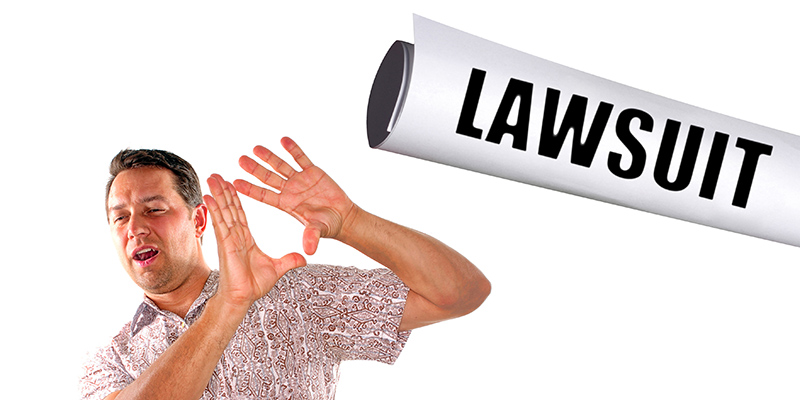Can Homeowners Sue HOA Board Members Or The Condo Board?

Can fellow homeowners sue HOA board members? Lawsuits are serious issues, and they easily drain a person's time, energy, finances, resources, and emotions. The possibility of facing them makes people who want to help the community second guess their decisions.
Browse By Category
Sign up for Our Newsletter
Can fellow homeowners sue HOA board members? Lawsuits are serious issues, and they easily drain a person’s time, energy, finances, resources, and emotions. The possibility of facing them makes people who want to help the community second guess their decisions.
Can You Sue HOA Board Members? Can Condo Board Members be Sued?
Whether you’re in a condominium complex or a planned HOA neighborhood, you can be sued as a board member. Anyone can be sued by other people, whether your board actually made a mistake or is only accused of something. A disgruntled homeowner may look for someone to blame, and the easiest targets for community-related disputes are HOAs or condo boards.
But are HOA board members personally liable in lawsuits? The answer is not as clear-cut, especially when it comes to individual liability.
In most cases, an HOA or condo board member can be protected from liability in case of a lawsuit. However, this will depend on and should be included in your homeowners association’s articles of incorporation, bylaws, or governing documents. There are also other provisions that offer protection when homeowners are suing the condo board of directors or HOA board of directors.
State Laws and Suing Hoa Board Members
Can homeowners sue homeowners association board in all states? Many states have laws that protect board members from personal liability, but only to a certain extent.
For example, California’s Civil Code Section 1365.7 states that volunteer association board members aren’t personally liable for damages beyond what the HOA’s insurance covers. These damages can include property damage, emotional distress, bodily injury, and even wrongful death. Of course, board members must meet certain requirements to qualify.
Not all states have the same law as California, though. As a board member, if you are concerned about your status regarding the matter, you can research your own state’s legislation for protections that may apply to you. You can also consult an HOA attorney for clarification.
Can HOA Board Members Be Sued Individually?
Can homeowners take legal action against HOA board members individually? This is a question many ask and one that discourages many residents from volunteering to run for positions on the board.
HOA and condo board members need to be aware that they are not completely immune from personal liability. If the court finds that a board member engaged in fraudulent or malicious behaviors, it will hold them accountable for their actions.
One example is when a board member takes advantage of benefits unavailable to non-board members. It may also happen when the member borrows or uses the association’s funds for personal use.
The court will find board members personally liable if they neglect their duties. If problems arise because the board treasurer did not check financial reports against bank accounts, the members can potentially be sued.
Homeowners can also sue a board member if he puts his personal interests above the community. For example, a board member may hire a service provider owned by family members rather than one who is most qualified for the job.
Understanding the Business Judgement Rule
When a homeowner sues the HOA board or condo board members, they can use the Business Judgement Rule to protect themselves from liability. Under this legislation, the board of directors is immune from personal liability if they can prove that their actions or decisions were reasonable and made in good faith.
The Business Judgement Rule usually rules in favor of the board of directors. This means that when homeowners sue condo board or HOA board members, a judge may throw out the case if the board member acted within the scope of their authority. This argument may stand even if the board member’s decision was, in the end, a bad one.
The key to invoking this rule is establishing whether the condo board member upheld their fiduciary duty and acted in the best interest of the association. If they didn’t, it can lead a homeowner to sue HOA for breach of fiduciary duty.
It’s also important to remember why the Business Judgement Rule is predisposed to favor the board. Board members are ultimately in volunteer positions. They don’t receive compensation for their services to the association. Given this fact, without any legal protections for the members, no one would even volunteer to join the board.
The courts understand that board members are not perfect. People won’t always make the right decision every time. However, if it is clear that the board member did not act fraudulently or unconscionably, the judge will not proceed with the suit.
What Can You Sue an HOA For?
Although it’s not uncommon to find homeowners suing HOA board of directors, most of those lawsuits are usually unsuccessful. Still, most of those were dismissed because of legitimate reasons. As a board member, you shouldn’t become lax or abuse your power in any way.
While homeowners can try to sue board members for just about anything, the most common reasons include the following:
- Failure to maintain common areas or elements. HOAs are responsible for the maintenance and upkeep of common spaces and elements. When they fail to do that, homeowners can sue.
- Selective enforcement. If an HOA board does not uniformly enforce rules, homeowners can sue HOA for selective enforcement.
- Misuse of funds. Theft, embezzlement, or fraud happens all the time—even in an HOA or condo association setting.
- HOA Discrimination. Can I sue my HOA for discrimination? Yes. When an HOA board violates federal and state Fair Housing laws, homeowners can sue for discrimination.
- HOA Harassment. Can you sue HOA board members for harassment? Board members who harass other members or abuse their power can use the law as a weapon to protect themselves and seek retribution.
- Negligence. Can I sue my HOA for negligence? Board members have certain fiduciary duties to uphold, including the duty of care. Failure to uphold these duties can result in homeowners suing the HOA for negligence. The same goes for condo associations. Owners can sue condo associations for negligence.
Specific Reasons to Sue an HOA Board
Can you sue HOA board members for anything? More specifically, homeowners might sue an HOA board for the following actions:
- Failure to maintain community amenities and common areas
- Inadequate or lack of security (such as placing security cameras at gates or on private roads)
- Remodeling disputes or denial of architectural changes
- Holiday decoration disputes
- Flag restriction disputes
- Election disputes
- Pet disputes
Specific Reasons to Sue a Condo Board
On the other hand, here are some possible reasons for suing condo association boards:
- Failure to maintain common elements, such as walls, plumbing, etc.
- Failure to ensure safety in common or shared spaces (such as security cameras in hallways, maintaining fire alarms, removing fire hazards, maintaining elevators, etc.)
- Election disputes
- Pet disputes
How Can HOA Board Members Protect Themselves?
 It is comforting to know that HOA and condo board members have some legal protections. However, regardless of whether the judge votes in their favor, board members still worry about the legal expenses and resources needed to respond to an HOA lawsuit.
It is comforting to know that HOA and condo board members have some legal protections. However, regardless of whether the judge votes in their favor, board members still worry about the legal expenses and resources needed to respond to an HOA lawsuit.
Your condo association’s insurance should cover all your legal expenses. Some insurance companies may cover legal expenses under the general liability policy. However, board members should seriously consider adding Directors and Officers insurance.
With D&O insurance, board members can expect their insurance company to provide the money for legal counsel and other expenses. This insurance type also protects board members’ personal assets from litigation.
If a homeowner sues both the board and its individual members, a board member can seek separate counsel. This will protect the personal interests of the board member. However, the board member can still ask the association or its insurance company to take care of the legal expenses.
Meanwhile, condo associations should also consider Crime and Fidelity insurance coverage or Employee Dishonesty insurance coverage. These will protect the association should a board member commit a criminal act such as fraud or embezzlement. With this kind of insurance, the association will not be held liable for the money that may have been stolen or misused by the board member.
What to Do If You Are Personally Sued
Can a nonprofit board member be sued individually? The short answer is yes. Try as you may, you can’t please everyone in your HOA or condo community. Disgruntled homeowners can still choose to take legal action against you even if their claims are baseless. Still, you must be prepared for whatever they throw at you.
If a homeowner personally names you in a lawsuit, your first reaction should be to contact your HOA insurance agent. Using certified mail, send copies of the lawsuit to your agent. Provide the agent with all the pertinent details, including when you were served the papers and the deadline for a response.
Your insurance carrier will usually defend you in cases like this. But, sometimes, they will recommend that you hire an attorney to personally represent you. This usually happens when your interests don’t align with the association’s interests. In that case, you can’t have the same attorney defending you and the association as well. Keep in mind that your HOA’s insurance will not cover the cost of your personal attorney.
The Bottom Line
Can HOA members be sued even if they’re part of the board? As discussed, yes, they can be, whether collectively as the board or individually. But there’s no guarantee that they will win. Board members are afforded a certain level of protection from personal liability, both through state laws and the association’s governing documents. Additionally, insurance usually covers any legal costs associated with the suit.
Still, that doesn’t mean you should ignore such actions. If homeowners sue HOA board members for a bad decision — even with the possibility of the lawsuit being dismissed — this could drain association funds and resources. Worse yet, if a homeowner wins a lawsuit against HOA, it could spell more financial loss for the association.
To avoid any possible instances that can lead to homeowners deciding to sue HOA board members, let a professional management company help you out. If you’re searching for one right now, our online directory can be of great service to you.
RELATED ARTICLES:
- What Are HOA Disputes? How To Practice Dispute Resolution?
- Are You An HOA Board Member? Here’s Why You Need HOA Directors And Officers Insurance
- HOA Attorneys – Why They Are Important And How To Find One
Trending Now
Related Article
Sign up for Our Monthly Newsletter
Sign up below for monthly updates on all HOA Resource















